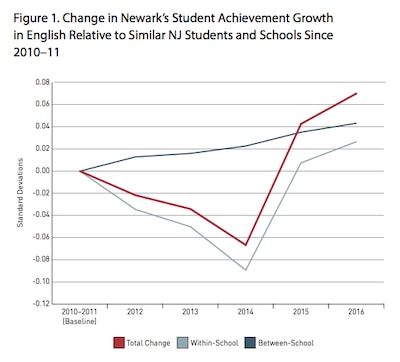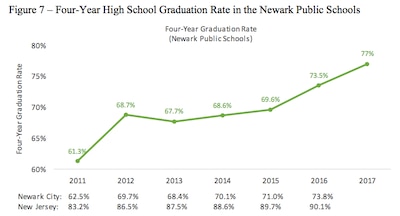It was announced with much fanfare on Oprah in 2010: dramatic changes were coming to Newark’s schools, financed with $100 million from Facebook founder Mark Zuckerberg.
Those changes — including a new teachers’ contract and the expansion of charter schools — proved controversial and challenging to implement. But there hasn’t been a clear answer to the key question: Are students learning more now than they were then, thanks to the reform effort?
A new study, released Monday through the National Bureau of Economic Research, is among the first to try to answer.
It finds that by 2016, Newark students were making greater gains on English tests than they were in 2011. But the results are not uniformly positive. It finds no impact in math. And in both subjects, the reforms seem to have come with a cost: student achievement declined substantially in the first three years of the changes.
The study was funded by the Chan-Zuckerberg Initiative and conducted by a number of Harvard researchers, including Tom Kane, who said that the study’s results were independent of its funding source.
“This study confirms the progress that is being made in Newark schools,” Newark schools superintendent Chris Cerf said in a statement, “and shows that reforms undertaken — particularly in areas like citywide enrollment and expansion of high quality schools — are making a real difference for Newark students.”
Their findings have both educational and political import.
The 2010 announcement was heralded as a rare and powerful bipartisan alliance, with Democratic Mayor Cory Booker and Republican Governor Chris Christie united in their plan to make sweeping changes to Newark’s struggling schools and backed by Zuckerberg’s millions.
(The money — $100 million with another $100 million match — seemed eye-popping, though it only accounted for 4 percent of school spending in the city over the five years of the grant.)
The changes would include not only charter schools and performance-based pay for teachers, but also the closure of a number of district schools, and new enrollment system encompassing district and charter schools.
The initiatives soon came under scrutiny. Residents and students pushed back forcefully against some of the changes implemented by schools chief Cami Anderson. Ras Baraka, a school principal and sharp critic of Anderson, was elected mayor in 2014, beating Shavar Jeffries, who was more amenable to the reforms. Anderson was replaced by Cerf in June 2015.
Journalist Dale Russakoff wrote a largely critical account of changes that focused on how a large share of the Zuckerberg money went to high-paid consultants. Since, media reports have largely suggested that the approach failed and that the money was wasted.
Now, the central characters have largely moved on. But Zuckerberg and Booker, now a U.S. senator, are rumored to have national political ambitions, including potential runs for president in 2020.
Here are the key takeaways:
The overall effect of the reforms on student learning was mixed.
“By the fifth year of reform, Newark saw statistically significant gains in English and no significant change in math achievement growth,” the researchers conclude. “Perhaps due to the disruptive nature of the reforms, growth declined initially before rebounding in recent years.”

The research, also released as a non-technical report, looks at two ways the reforms may have affected students: by making existing schools better and by moving students to more effective schools, including charters. Moving students to better schools did help, but existing schools didn’t consistently improve – and in the first three years got substantially worse in both subjects.
Something we still don’t know is what the cumulative impact of the reforms was on a student who attended Newark schools for five straight years. The study doesn’t answer that.
Another perhaps surprising finding, considering the common description of Newark schools as failing: The district had a growth rate before the changes that was about average for similar districts in New Jersey.
Students seemed to benefit from school closures.
The study finds students whose school was closed subsequently saw higher test score growth, particularly those moving into better schools. That’s consistent with other research. But Newark did not seem to close its worst schools, and even shut down a few schools that were average or above average. That might have limited the positive effects of closures.
Charter schools continued to outperform the district, but have grown less effective.
Part of the reform strategy was to expand Newark’s charter sector, since charter schools had been shown to substantially raise student test scores, relative to the district. The latest study found that charters continued to do better than the district, but the gap has essentially been cut in half.
That’s because charters’ effectiveness has decreased since 2011. It’s not clear why, but three times as many students attend charter schools in Newark now compared to 2010. That influx of new students and accompanying growing pains may be part of the explanation.
The study also shows that charter schools serve different students than the district. Newark’s charter students are more likely to be African-American and female, and less likely to have a disability or limited proficiency in English.
The study comes with a few important caveats.
The spike in test-score growth toward the end of the five-year grant coincided with the introduction of a new test aligned with the Common Core, the PARCC. It also coincided with an increase in students opting out of state tests, both in Newark and statewide. The researchers try to account for this, but it’s not entirely clear if those changes skewed the findings.
Also, the researchers came to their conclusions by comparing test score growth of Newark’s students to students with similar backgrounds and in similar schools across New Jersey. That doesn’t guarantee that the study is able to isolate the effects of the reforms, but does allow for comparisons to places without the Zuckerberg money or attention.
The results don’t show whether the reforms “worked” — because that’s a complicated question.
The study is focused on standardized test scores, a significant limitation that means it doesn’t speak to other effects of the reforms on students. A separate analysis, funded by the Community Foundation of New Jersey and also released Monday, points out that high school graduation rates in Newark rose substantially in 2016 and 2017, after remaining flat between 2012 and 2015. Enrollment in the city schools has also trended upward in recent years.

The results also don’t account for political turmoil or the sense that the reforms were done to — rather than with — the community in Newark, whose schools had been under state control for a over two decades. An agreement was finalized in September to return them to community control.
“Ultimately we’re giving the parents the opportunity to have their democratic rights back,” Baraka told NPR, who argued in the same interview that the Zuckerberg dollars had not improved the school district. “There is no real kind of causal relationship between that money and the development of the traditional public schools in Newark.”


